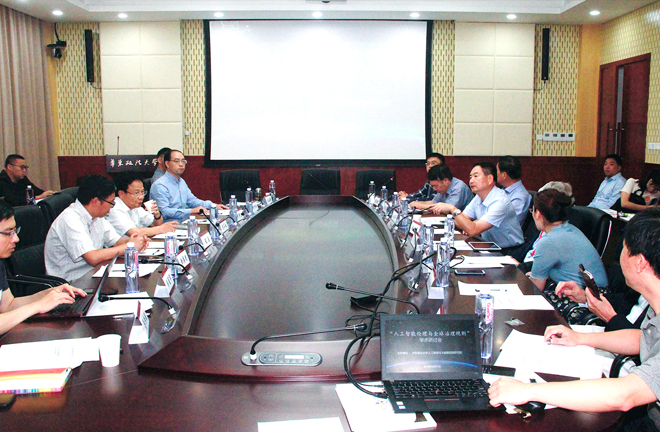Scholars explore global governance mechanisms on AI ethics

Scholars at a symposium on Artificial Intelligence (AI) ethics and global governance Photo: CASS
Recently, a symposium on Artificial Intelligence (AI) ethics and global governance was held at East China University of Political Science and Law. Scholars and experts held in-depth discussions on such issues as AI’s global vision and the governance of AI ethics.
Peter Major, vice-chairman of the UN Commission on Science and Technology for Development, analyzed a series of changes in AI’s development process. He put forward that, by using AI, UN institutions can conduct more effective research and carry out cooperation. Meanwhile, the UN is proactively exploring principles of AI governance and is making efforts to establish multilateral consultative mechanisms for the application of AI. The UN needs to help those relatively backward countries catch up with the digital age and ensure that all social groups can benefit from the development of AI technologies.
Jeroen van den Hoven, a professor at Delft University of Technology and a permanent member of the European Group on Ethics (EGE) to the European Commission, said that Europe must maintain concern for human rights, freedom and dignity while developing AI. Concerning the moral and ethical issues related to human life, safety, health and wellbeing, Hoven said that the key point is to clarify such human rights as privacy and freedom of choice. On this basis, we should guide the design of AI products and even the whole industry’s development through the establishment of value guidelines, as people’s values and conceptions will determine AI’s development.
Wang Chunhui, dean of the Institute of Digital Economics of the United Nations World Silk Road Forum, said that AI technology is at a stage featuring emerging issues that need to be resolved. He put forward that we should contemplate AI’s progress from a prudent and humanist perspective. Human wisdom can advance or ruin civilizations depending on its application, therefore, we should apply human wisdom with prudence.
Li Xiuquan, deputy director of the New Generation Artificial Intelligence Development Research Center at the Ministry of Science and Technology, said that we should face the fact that, currently, AI development is at its primary stage. We should not overestimate the achievements it might make in the next three to five years, nor should we underestimate the profound transformation it will bring after a decade. AI is facing issues in terms of technology, governance and ethics that are of equal importance but requiring of different amounts of time to address, which merits global attention. As AI is booming, China has accumulated successful experience and confronted problems. Therefore, the Chinese government has attached great importance to international cooperation in AI governance and hopes to address issues through international dialogues and coordination.
edited by SU XUAN

 PRINT
PRINT CLOSE
CLOSE